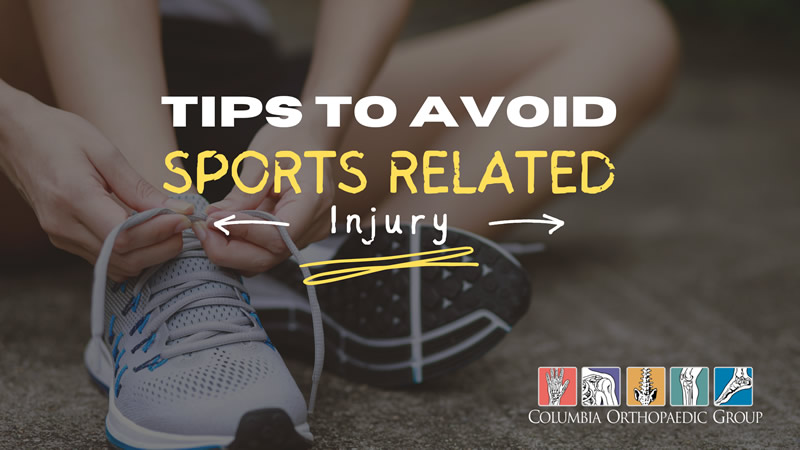
Tips To Avoid Sports Related Injury
Finally, spring has sprung and the cold weather is on its way out. For many people, spring is the time to get up and get outside to actively enjoy the sunshine. While an active lifestyle is encouraged, if you "spring" into activity too fast there could be some serious consequences. Gear up for a successful season by easing your body into the sports season to reduce your risk of injury. Follow these tips for sports injury prevention.
Ramp up carefully
If you're like many people, you lose a bit of your fitness over the winter. If you get back out and try to perform at a higher level than your fitness allows, your risk of injury is far higher.
For example, if you haven't run in a couple of months and you decide to do a quick three miles, the result could well be shin splints. Muscle strains are often the result of similar causes. Make your first few workouts easier than you think they should be. Increase your strength and stamina slowly and protect yourself!
Many people also think that their walking or running habits don't need to be adjusted since they used a treadmill during the winter months and remained active – That's not the case. Running on the road is more challenging than on a treadmill since the belt continues to move, relieving some stress from leg muscles. The body needs time to adapt to the different stresses such as terrain, wind, and varied need for oxygen.
Before you even hit the pavement or track, boost your confidence with the right running shoes.

Some running injuries that physical therapists treat include piriformis syndrome, runner's knee, shin splints, and others. Reasons for these injuries mainly involve improper footwear, increasing mileage or intensity too quickly, and poor running mechanics. It's important to remember that even if running shoes look brand new and seem to have limited wear, the cushion could be deteriorating.
Warm up, cool down
Done correctly, warming up and cooling down may offer help in reducing your risk of injury and improving your athletic performance.Taking 5-10 minutes to get your body ready for exercise and a few more to stretch and cool down could be the difference between six weeks of recovery and having fun playing your sport.
A warm up gradually revs up your cardiovascular system by raising your body temperature and increasing blood flow to your muscles. Warming up may also help reduce muscle soreness and lessen your risk of injury.

Cooling down after your workout allows for a gradual recovery of pre exercise heart rate and blood pressure. Cooling down may be most important for competitive endurance athletes, such as marathoners, because it helps regulate blood flow. Cooling down doesn't appear to help reduce muscle stiffness and soreness after exercise, but more research is needed.
Cross-train
If you love riding your bike, you may be tempted to do it every time you work out. It's fun! You enjoy it! Why not?
It's easy to develop muscle imbalances that can lead to injury if you don't participate in some cross-training activities. You're also more likely to develop overuse injuries without variation in what you do.
Workouts without some variability increase your risk of sustaining an injury from repetitive strain or overuse. An ideal cross-training routine incorporates cardiovascular exercise, strength training, and flexibility exercises like yoga or Pilates.

Cross training has several benefits, including full body conditioning; improving skill, agility and balance; flexibility in training plans; and the opportunity to continue training while injured. The most important benefit of cross training is that it reduces the risk of injury, which is accomplished by working certain muscle groups while others rest.
A balanced, weekly cross-training program might look like this:
- Aerobic exercise: Three times a week for at least 30 minutes. Alternate activities such as walking, swimming, dancing, and stair climbing.
- Strength training: Twice a week (not consecutive days) for at least 30 minutes, working each major muscle group. Try to do different exercises for each muscle group on alternate days, or use different resistance tools, such as free weights or stretch tubing.
- Flexibility exercise: Every day for at least 5 to 10 minutes. Stretching exercises may be done daily, but be sure to warm up your muscles with a short walk or other aerobic activity before you stretch.
Don't Play if You Are Injured
It may be difficult, but do not continue to participate in sports or activities if you have sustained an injury. It is not safe to "play through the pain" and could result in a more severe injury or a chronic problem. Allow the injury time to heal before you return to practice. Continuing to play if you have an injury can make that injury worse. A small stress fracture that might have healed quickly can grow into a more serious, more painful fracture that will take longer to heal.

If you have questions about returning to activity safely, or you suspect you've sustained a sports injury, schedule an appointment with one of our sports medicine specialists.
After an injury – what next?
Unfortunately, injuries do occur. Taking the proper steps to reduce the risk of injury is important, but sometimes things happen unexpectedly.
- If you do find yourself injured or sore, try abiding by RICE- rest, ice, compression, and elevation
- Seek early medical evaluation for diagnosis and to begin a treatment plan.
- Physical therapy will likely be an important component of a complete recovery. It is important to follow through with a rehabilitation program to make sure the injury has not just recovered from pain, but that your body is back to functioning at full strength. The goal is to avoid recurrent pain, further injury and to get athletes back in the game, safely.
- A safe and gradual progression is important to prevent recurrent injury.
Remember, sports are fun and injuries can be prevented. Take the time to warm up properly, listen to your body and if something happens unexpectedly, seek early medical evaluation.
At Columbia Orthopaedic Group, we take a team-based approach to treating sports injuries. Depending on the type and severity of the injury, the team may include a primary care sports medicine physician, orthopedist, and physical therapist.

Our physicians are board-certified and fellowship-trained to provide the highest level of orthopaedic care to our patients.
Schedule an appointment, call 573-443-2402 or request online.
